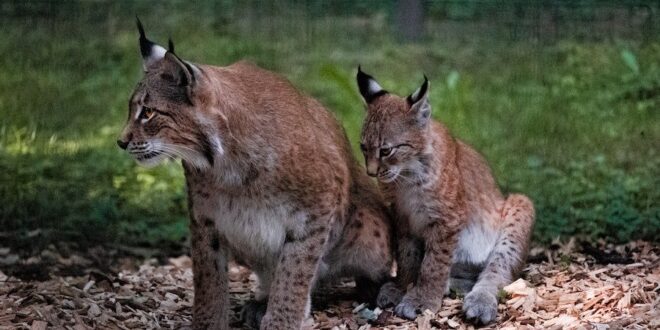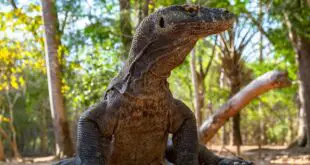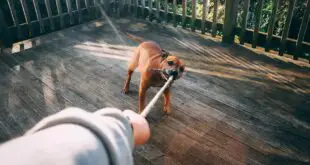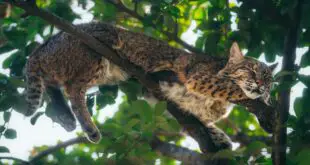You must have encountered these remarkable canines on a hiking trail and wondered, has a bobcat ever killed a human?
Bobcats are relatively big, fast, and powerful, so they seem to have the potential to attack and kill a human, but how much danger do they pose?
This article will go into the details about bobcats so you understand how they select their prey and how dangerous they are to humans.
It is important to understand nature if you are to live in harmony with its elements, so let’s get into the details and find out more;
Has A Bobcat Ever Killed A Human?
No, there aren’t any documented human fatalities from bobcat attacks. Bobcats are elusive and scared of humans, so they always try to avoid contact.
They will only attack in self-defense, especially if their young are nearby, but they will not attempt to kill you. In most cases, a few scratches will scare you away from their territory.
How Dangerous Are Bobcats?
You must have encountered a bobcat on a hiking trail or in the woods and wondered how much danger you are in.
Bobcats are common in the United States, especially in mountainous suburban areas, and you will inevitably run into one or two.
Many states allow you to legally hunt them since they aren’t an endangered species, but you will need a permit for safety. With this in mind, the question remains: how dangerous are bobcats?
Bobcats are naturally shy and solitary creatures, so they rarely initiate contact with humans or other big animals.
They mostly live alone, and like most other cat species, they rarely share territory with other cats of similar gender, especially males.
This means each bobcat has a territory where it lives, hunts, and mates, so you will likely meet one within this region. Bobcats naturally fear humans, but sometimes they show aggression, which can end badly.
Bobcats are like house-cats on steroids. They are bigger, faster, have longer claws, and have the potential for more damage in case of an attack. Despite this, they almost always run away from humans, so attacks are rare.
Even with this in mind, you should give them space and avoid these cats in the wild to avoid provoking them. A bobcat can run about 30 miles per hour, so it can quickly pounce and hurt you if it attacks.
Suppose you see one outside; slowly back away while facing it until you reach a safe distance, or it runs off. Use loud noises to scare it away if it is near your home, especially if you have pets. In most cases, bobcats will attack to defend themselves.
This could be if you move or act in a way that makes it think you want to attack or if it’s a mum with the cubs nearby. They are fast with razor-sharp claws. Their bite power is stronger than that of foxes, coyotes, and even cheetahs.
They have nerves in their teeth that help them figure out the best places to bite down on prey and meat so that the attack does maximum damage. They might be small and cute, but bobcats can hold their own and are potentially dangerous if threatened.
Are Bobcats Dangerous To Pets?
The main reason you are safe from a bobcat is that you are big, and it’s scared of you more than it wants to eat you, but what about your pets? They are small enough that they might be prey for the bobcat, so are they in danger?
Bobcats are opportunistic hunters that mainly prey on small animals. They will kill and eat small and weak animals if they get the chance, so a bobcat will see small dogs, cats, hamsters, and other small animals as appealing prey.
A bobcat is more likely to attack a dog under 30 pounds, but it threatens dogs of all sizes. Some species, like pit bulls and Rottweilers, can hold their own, and a bobcat will avoid them, but smaller dogs don’t have that luxury.
There are many cases of bobcats attacking and killing outdoor pets, sometimes for food, others for territory, or in self-defense.
Bobcats will primarily be attracted by food such as rodents, pet food, wild bird scraps, and small domestic animals.
Remove the food, water, or shelter that might attract bobcats to your property to avoid conflict. Bobcats are nocturnal, so they are more likely to attack pets after dark, so install lighting and have high fences and walls around your pets.
Despite their passive nature, bobcats can be dangerous, and it is always best to be careful around them.
How to Protect Your Pets from Bobcats and Other Wild Animals?
Bobcats might not be a life-threatening concern for you, but the story differs for your pets. Bobcats are predators, and don’t let their small size fool you; they could square up with and kill most household pets. Even large dog breeds could get serious injuries from bobcats.
As a pet owner, you must know how to protect your pets and keep them from becoming a bobcat’s next victim.
This is especially important if you live in a mountainous region that could potentially have bobcats. Let’s get into the details;
1. Always keep your dog on a leash.
Always walk your dog on a leash. This prevents them from wandering too far and encountering bobcats or other wildlife.
Keep your dog close to you during walks to reduce the chances of unexpected encounters, and your presence provides additional protection.
2. Don’t miss any pet vaccinations.
Ensure your pets are up-to-date on vaccinations. Some wildlife can transmit diseases to dogs and cats, such as feline panleukopenia, canine distemper, and rabies.
Regular vaccinations help protect your pets from these health risks in case they get bitten or scratched by a wild animal.
3. Properly fence and maintain your yard
Take steps to avoid attracting bobcats to your yard. Keep your property clean by removing brushy areas, woodpiles, and potential food sources like fallen fruit or pet food. You reduce the likelihood of bobcats visiting your property by eliminating these lures.
4. Keep your cats indoors.
Do not allow cats and other small pets to roam freely outdoors. Some cities have laws against free-roaming cats for good reason.
Cats are not only at risk outdoors but can also prey on wildlife, disrupting local ecosystems and attracting predatory animals like bobcats to your yard.
Keep the cat indoors or secure your yard so it has space to play without getting into scraps with local wildlife.
5. Steer clear of bushy areas that could house bobcats
Avoid bushy areas or paths near abandoned properties when walking your dog or spending time outdoors. These areas can serve as hiding spots for bobcats and other wildlife, and the presence of another predator or potential meal could instigate an attack from them.
6. Scare the bobcats away from your home.
If you spot a bobcat or coyote in your area, never let it pass by without taking action. Yell or clap loudly to scare the wildlife away. Carrying an air horn or a throwable object like a rock or baseball can deter them.
Maintaining their fear of humans is crucial for everyone’s safety since they will otherwise get bolder and start hunting in human neighborhoods.
7. Discourage Pet Interactions with Wildlife
Never encourage or allow your pet to interact or “play” with wildlife. This can lead to dangerous confrontations and harm to your pet and the wild animals. Train your pets to avoid wild animals since they are dangerous and unpredictable.
8. Securely Fence your backyard.
Ensure your fence is in good repair and tall enough to deter bobcats from entering your property. Bobcats are skilled climbers, so consider adding deterrents like rollers or overhangs to make it more challenging for them to scale the fence.
9. Keep an eye on your pets when they play outdoors.
Do not leave your pets unattended outdoors, especially during dawn and dusk when bobcats are most active. Supervision reduces the risk of encounters and allows you to react quickly if needed to keep your furry friends safe.
10. Remove potential food sources from your yard.
Remove potential food sources from your yard, such as fallen fruit and pet food left outside. Doing so reduces the incentives for bobcats to visit your property so you and your pets can be safer in your home.
Conclusion
For the readers wondering, has a bobcat ever killed a human? You now have your answer and a better understanding of this elusive canine.
There isn’t any documented case of a bobcat killing a human, but there are several videos of vicious attacks.
Bobcats might attack if provoked, but most attacks are defensive, so they won’t end in human death. The real danger is when they come across small pets since they are predators. They might attack and kill small animals, so take every precaution to protect your pets.
 Being Human
Being Human





